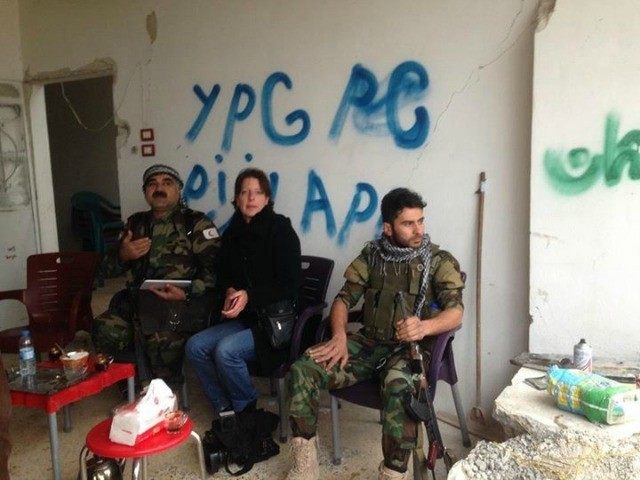The Turkish prosecutor in Diyarbakir, the symbolic capital of the Kurds, charged Dutch journalist Fréderike Geerdink with “terrorist propaganda.” She faces one to five years in prison if found guilty.
Geerdink moved to Diyarbakir in 2012. Her areas of expertise include Kurds, human rights, and women’s rights. Police brought her in on January 6 while a terrorism squad searched her apartment. After three hours, she tweeted that the police had released her.
According to the indictment, the court “accuses Geerdink of posting messages on social media in favor of the outlawed Kurdistan Workers party (PKK), including a display of the group’s flag.” She denies the charges, but will be in court on April 8. The indictment occurred on the same day President Recep Tayyip Erdogan “declared at a meeting of ambassadors in Ankara that ‘there is no freer press in Europe or elsewhere in the world, than in Turkey.’”
She reports for several Dutch outlets and is “the only foreign correspondent” in Diyarbakir. She wrote the book The Boys Are Dead, about the “bombardment of the town of Uludere, where 34 Kurdish boys and men were killed.” Turkish Justice Minister Bekir Bozdag justified her arrest by claiming that any other country in Europe would demand the testimony of a Turk “if they made propaganda of a terrorist organization.”
The Turkish government has increasingly moved to silence anyone who expresses criticism of Erdogan. Authorities arrested 26-year-old former Miss Turkey, Merve Buyuksarac because she quoted a poem on social media that insults the President. Professor Hasan Herken, dean of the medical faculty at Turkey’s Pamukkale University, resigned after he mocked a man dressed as Erdogan’s “16 warriors,” representative of various manifestations of the Turkish empires throughout history.
“Which Turkish principality is this one wearing a bathrobe?” tweeted the professor.
Turkey, the United States, the European Union, and NATO consider the PKK a terrorist organization. Human Rights Watch and Amnesty International have hammered the Marxist organization over its severe human rights abuses. The organization was formed in 1978 to demand separation from Turkey to form Kurdistan. The first insurgency against Turkish forces began in 1984 and ended in 1999. But the PKK ended a ceasefire in 2004 because they claimed the Turkish government was still attacking their forces. Their jailed leader Abdullah Ocalan said in August 2014 that the bloody conflict, which left over 40,000 dead, is coming to an end.
As the Islamic State (ISIS/ISIL) attempted to capture the Kurdish town of Kobane on the Turkey-Syria border late last year, the Turkish government chose to bomb positions of the PKK instead of the Islamic State. The PKK then announced that their fighters would return to Turkey.
“Because Turkey has continued to pursue its policies without any changes, we have sent back all our fighters that were pulled out of Turkey,” said senior PKK commander Cemil Bayik.

COMMENTS
Please let us know if you're having issues with commenting.